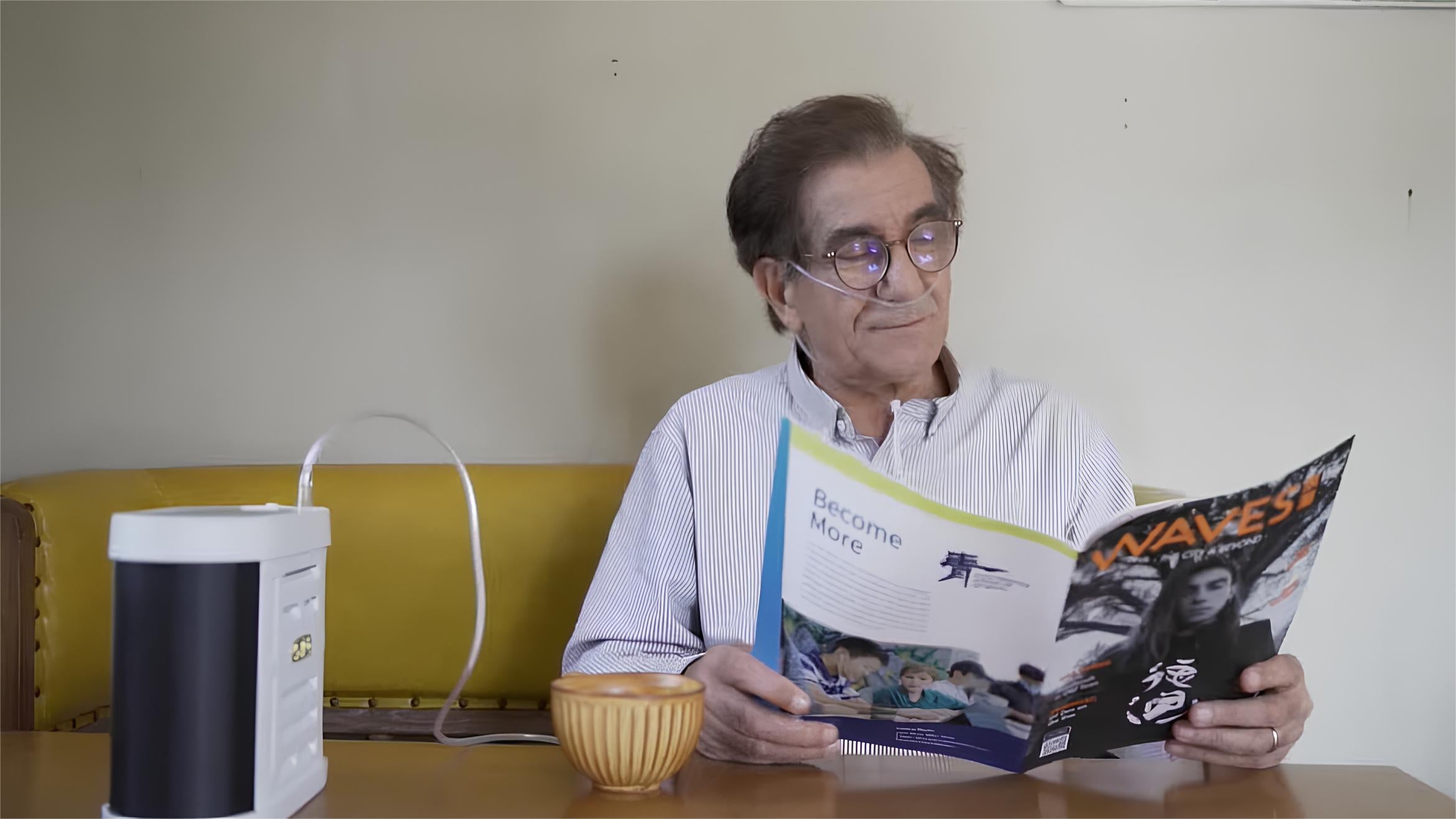If you're searching for the best portable oxygen concentrator for an elderly loved one, it's crucial to choose a device that fits their lifestyle and health needs. These handy machines are lifesavers for those with breathing issues, offering independence and the freedom to go out without worrying about oxygen.
In this article, we'll guide you through the ins and outs of selecting a perfect concentrator-focusing on the ones that are easy to carry, simple to use, and reliable enough to support everyday activities. Stick with us to find out which models really work well for older adults and how these devices can help improve their day-to-day lives.

What Do Elderly Patients Need in a Portable Oxygen Concentrator?
For elderly patients with lung issues, breathing easily can be a constant challenge. Conditions like COPD make it hard to breathe, so activities that should be simple, like walking or shopping, can become difficult. Portable oxygen concentrators (POCs) are vital for these patients because they provide a steady supply of oxygen no matter where they are.
Elderly users have specific needs for their POCs. They need devices that are light enough to carry without effort and simple enough to use without confusion. The POC has to be durable too-it needs to withstand daily use without needing frequent repairs. The right device will fit into the patient's life seamlessly, making it easier to stay active without worrying about their oxygen supply.
Now, let's talk about what features make a POC suitable for an elderly person. We're aiming for the lightweight portable oxygen concentrator, with a battery that lasts a whole day, adjustable oxygen settings that aren't noisy, and controls that are easy to understand and handle. It also should be well-built to avoid frequent replacements. In the next section, we'll go over these features in more detail, so you can choose a POC that fits just right.

What Should You Look for in a Top Portable Oxygen Concentrator?
When picking out a portable oxygen concentrator for an elderly patient, there are several key features to consider. Let's break them down one by one:
- Weight and Portability: The best POC should be light. Elderly users need to be able to move around easily with their devices, so the lighter it is, the better.
- Battery Life: It's important that the POC can last through daily activities without needing a charge. This means looking for a device with a battery that can last at least several hours. Some models also offer extra batteries or special chargers for more convenience.
- Oxygen Delivery: There are two types of oxygen delivery – continuous flow and pulse dose. Continuous flow provides a steady stream of oxygen, while pulse dose delivers oxygen only when the user inhales. Adjustable flow settings are crucial, too, so the user can get exactly the amount of oxygen they need.
- Noise Level: While it's normal for a POC to emit some noise while operating, excessively loud models can be distracting or disruptive. Quieter units are ideal, particularly when you need to use your concentrator during social events or while sleeping, to minimize any disturbance.
- Ease of Use: The device should have a simple interface with clear controls. Elderly patients often prefer straightforward devices that are easy to operate and maintain, without needing to navigate complex menus or settings.
- Durability and Reliability:A well-built POC means fewer repairs and a longer life for the device. It's also good to know what kind of warranty or service plans are available, in case something does go wrong.
Each of these features contributes to the overall usability and satisfaction with a POC. In our next section, we'll review specific models that are known for their quality in these areas, helping you find a reliable and comfortable choice for your loved one's oxygen therapy needs.
How Should You Choose and Buy a Portable Oxygen Concentrator?
When the time comes to buy a portable oxygen concentrator for an elderly patient, making a well-informed decision is critical. Here are some practical steps to ensure you get the best device for your needs:
- Assess Individual Needs: Every person is different. Take into account how much the patient will use their POC outside the home, their specific oxygen requirements, and how easy they find operating technology. For instance, if they go out often, look for longer battery life. If they're not tech-savvy, choose a device with simple controls.
- Insurance and Medicare Coverage: Before making a purchase, check with insurance providers or Medicare to understand what costs they cover. POCs can be expensive, and getting financial help can make a difference. Some insurance plans may require renting a POC before they'll pay for a purchase.
- Avoid Common Pitfalls: It's easy to make mistakes when buying medical equipment. Avoid overly complicated devices if they're not necessary. Don't prioritize low cost over quality – it might mean more repairs later. And always buy from reputable suppliers to ensure you get a genuine product with a valid warranty.
Following these guidelines will help you navigate the process of purchasing a POC. Remember to also consider after-sales support and service options for the device you choose.
What Else Should You Think About When Using a Portable Oxygen Concentrator?
When you've almost decided on a portable oxygen concentrator, there are a few more things to think about. These details can greatly affect the day-to-day use and convenience of the device for an elderly patient.
- Traveling with a POC: If traveling is part of the routine for the user, it's essential to have a POC that is approved by the Federal Aviation Administration (FAA). Check the specifications or ask the supplier if the model is FAA-approved for use on airplanes. Also, look into the specific airline policies regarding POCs as they can vary.
- Emergency Preparedness: In case of power failures or emergencies, having a backup plan is important. Some POCs come with car charging adapters, while others might rely on external battery packs. Knowing how your device handles power and what alternatives you have in an outage is crucial.
- Supporting Accessories: Consider what accessories come with the POC or what can be purchased separately. Items like carry bags, carts, or extra batteries can make using and transporting the concentrator easier. Think about what accessories could benefit the user's lifestyle – for instance, a carry bag with a shoulder strap might be useful for someone who likes to walk in the park.
By considering these additional factors, you'll ensure that the POC you choose can support the user's lifestyle fully, whether at home, out on daily errands, or during travel.

Final Thoughts on Selecting the Right Oxygen Concentrator
Choosing the right portable oxygen concentrator for an elderly patient is a decision that can significantly affect their quality of life. It's not just about picking any device; it's about finding the one that aligns with their specific needs, lifestyle, and health conditions. From considering the weight and battery life to examining ease of use and noise levels, every feature plays a part in ensuring the POC enhances the user's life rather than complicates it.
Before making a final purchase, it is essential to talk with a healthcare provider. They can offer personalized advice based on the patient's medical condition, oxygen needs, and general health. This step ensures that the selected POC will be beneficial and appropriate.
Ultimately, the goal is to empower elderly patients with a sense of independence and enable them to live their lives with fewer limitations. With the insights provided here, you're now better equipped to choose a portable oxygen concentrator that can offer them the freedom and support they need.
FAQs about Portable Oxygen Concentrator
To further assist in your decision-making process, here are answers to some frequently asked questions about portable oxygen concentrators for elderly patients:
Q1: Can a portable oxygen concentrator be used all day?
Yes, many portable oxygen concentrators are designed to be used 24/7, as long as they have power. Look for models with long battery life or the option to use external batteries for all-day use.
Q2: Is it difficult to travel with a portable oxygen concentrator?
Traveling with a POC can require some planning, but it isn't typically difficult. Make sure the device is FAA-approved if you're flying and check with other transportation services for their policies. Additionally, plan for power needs during your trip.
Q3: How do you know if a POC meets the oxygen needs of the patient?
The patient's doctor will prescribe the necessary flow rate based on their condition. Ensure the POC you choose can deliver this prescribed rate, whether it's a continuous flow or pulse dose.
Q4: Do portable oxygen concentrators require a lot of maintenance?
Maintenance requirements vary by model, but generally, POCs need regular cleaning or filter changes. Some may require professional servicing periodically. Always follow the manufacturer's guidelines for maintenance.
Q5: Are portable oxygen concentrators noisy?
All POCs make some noise, but newer models are designed to be quieter. Check the decibel levels listed in the product specifications to find a quieter machine.
Q6: What happens if the portable oxygen concentrator stops working?
If the device stops working, contact the supplier or manufacturer immediately, especially if it's under warranty. It's also good practice to have a backup oxygen supply method until the issue is resolved.





Оставить комментарий
Этот веб-сайт защищается hCaptcha. Применяются Политика конфиденциальности и Условия использования hCaptcha.